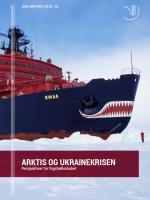Ukraine crisis interferes with Arctic cooperation
The Ukraine Crisis and the strained relations between Russia and the West have made it more difficult to cooperate in the Arctic. Russia and NATO conduct separate military exercises in the region, amidst loud protests and diplomatic spats and provocations. It remains to be seen whether the well-functioning cooperative regime in the region will survive the crisis.
A new DIIS report (in Danish), written by Jon Rahbek-Clemmensen, assistant professor at the University of Southern Denmark, takes stock of the situation in the Arctic. The report argues that although regional cooperation has taken a blow, the impact of the crisis is less severe than one could have feared. The Kingdom of Denmark (Denmark, the Faroe Islands, and Greenland) should continue to work for enhanced cooperation, but it should make plans for how to deal with sudden Russian aggression.
Military and diplomatic tensions have become more common in the High North, but neither Russia nor the West has gone as far as they could have gone. The real impact lies in economic relations. Russia’s Arctic oil and gas sector plays a crucial role in Russian grand strategy, but Russia has to cooperate with Western companies if it wants to extract those resources. This gives Russia an incentive to isolate the Arctic from the fall-out of the Ukraine Crisis. The West has exploited this vulnerability to weaken Russia by sanctioning this specific industry, which may make Russia more prone to aggression, even in the short term.
The report recommends that the Kingdom of Denmark follows a dual strategy in the High North. The Kingdom of Denmark should primarily continue to follow a cooperation-oriented strategy that attempts to engage Russia in the Arctic, as long as it does not contradict the West’s strong stance against Russia in general. The Kingdom should refrain from moving substantial military capabilities to the Arctic for now and it should pursue possible avenues for cooperation. The Kingdom of Denmark concurrently needs to prepare for a possible Russian policy change, as long as it does not undermine the cooperative policy. It is important that the Kingdom has contingency plans for how to create a new consensus in NATO and maintaining open channels to Moscow, should the situation change in the Arctic.


